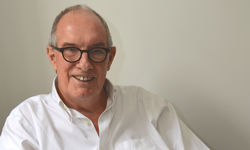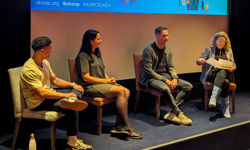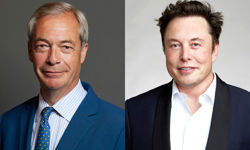I’m not entirely sure if having two giant screens on either side of the conference hall, showing the stream of #aopsummit tweets was altogether a good idea. Having half the delegates tweeting and the other half reading the tweets couldn’t have made life particularly easy for the speakers.
But, hey, if it was a mistake, then hats off to the AOP, because mistakes are GOOD and to be encouraged. So said award winning newspaper designer Jacek Utko, Future CEO Mark Wood and Guardian MD Tim Brooks, amongst others. Experimentation is key, and since “digital allowed you to fail more cheaply” (Brooks), there was nothing to stop you failing regularly. Since both Tim and Mark identified “clinging to old business models” as one of the main threats to their business, change and a willingness to experiment is vital.
Changing business models was one of the themes of the day, with the arrival this year of the iPad and the erection of the Times paywall. Times Digital Director Gurtej Sandhu manfully towed the party line by refusing to divulge any post-paywall figures, but might have inadvertently given the game away by his momentary hesitation, before answering ‘yes’ to moderator Robert Andrews’ follow up question about whether he was happy with progress.
Tim Brooks had earlier extolled the virtues of the rival open-access strategy by stating that one of the big opportunities the Guardian faced was how to monetise the sheer scale of their online presence. It’s probably safe to say that scale isn’t a problem News International will be grappling with in the near future.
Mark Woods also pinpointed global aspirations as one of the big opportunities for his special interests media business with some of their core disciplines (cycling, gadgets and music) having potentially global appeal.
The subject of scale even worked its way into the ‘World Class Editorial’ panel discussion, and there was a lively spat, err… debate, between Yahoo’s Chris Barr and the Mirror’s Matt Kelly over the respective merits of ‘scale’ and ‘engagement’. Chris’ assertion that articles must be search engine friendly, with the choice of words in the first 57 characters being particularly important, simply encouraged the creation of low grade search-fodder said Matt, who thought that the pursuit of engagement was a much more promising strategy for the future, although he lamented the fact that agencies were still obsessed with scale. A key challenge for the AOP, continued Matt, was to educate agencies about the value of quality content and engaged audiences.
And one of the reasons why SEO was not quite the be-all-and-end-all it once seemed to be was the rise and rise of social media. As the BBC’s David Moody said, most of the traffic to the successful Top Gear site now comes not from search engines but from Facebook. Top Gear was now treating Facebook as another media channel in its own right and had allocated half a person’s time to manage the Top Gear fan page there. And the strategy was paying off handsomely, with the number of Facebook friends and growth in traffic to the Top Gear site growing hugely and in tandem.
But, of course, just as a Facebook presence can help boost publishing brands, so it can also help boost the profile of some of our perhaps-soon-to-be-erstwhile commercial clients, like Unilever. Jay Altschuler, global media communications planning director at Unilever described how the multi-national’s marketing communications had undergone a sea change over the past year or so with the full-on embracing of social media platforms as a marketing channel. Perhaps it was because his was one of the late afternoon talks, and delegates might have been starting to anticipate the drinks reception, that the underlying message, that Unilever’s increased marketing investment in social media would inevitably mean a decreased investment in traditional media owners, didn’t spark the panic you might have expected.
Jay made the interesting point that if you were to make a success of social media, either as a brand or as a media owner, your team needed to “live the space”. To that end, he had devised a Digital IQ test, including such questions as ‘Do you have a social media profile? / Have you ever downloaded an app? / Have you ever bookmarked a page on Delicious? / Have you ever been asked to ‘keep it down’ on the train? / Do you annoy friends by incessantly referring to your smartphone in the middle of a conversation?’ etc etc. When first used, the average score in his team was 3, but that had now gone up to 8 or 9. In short you can’t get the best out of social media, unless your team is totally in tune with it.
The other big talking point of the day was apps, in particular the iPad. Whilst some were holding back until tablet penetration had gone beyond the three hundred thousand or so high earning, but not terribly representative, early adopters, it was generally agreed that this was a game changer.
And lastly, to leave you with one final depressing / energising (depending on your outlook) thought. The pace of change is about to accelerate, and, virtually to a man, every speaker said they didn’t know what was going to happen. NO ONE KNOWS ANYTHING! Aaaaaaaagh! Ahem … on reflection, it seemed to me that if you took dunnhumby’s John Butler’s advice about relentlessly focussing on your existing customers’ needs, as opposed to blindly chasing new customers or trying to second guess the next technological advance, then everything else should fit into place. Of course, that does rather presuppose that you’ve got enough customers in the first place.
A round-up of the event, along with pictures, can be found on the AOP website.










